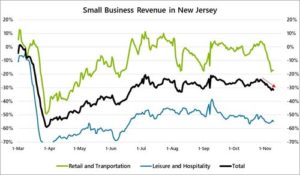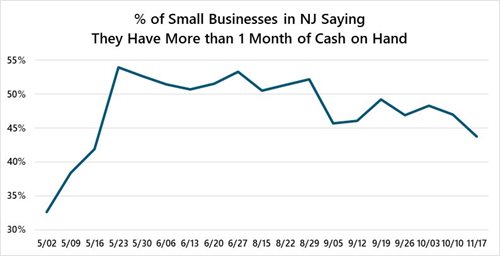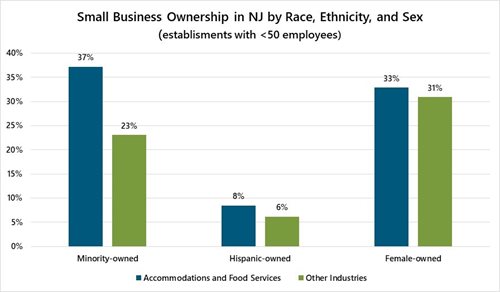TRENTON, N.J. (September 8, 2021) – The New Jersey Economic Development Authority (NJEDA) announced today that it will host a series of three virtual small business resource workshops to present information on available resources to support the growth of the state’s small businesses. The workshops will be held during National Small Business Week (NSBW), which runs from September 13 to 17 and will connect business owners with the people and information they need to start or grow their businesses with building their long-term resilience in mind as we emerge from the COVID-19 pandemic.
The hour-long workshops will offer small businesses, startups, and nonprofits an opportunity to connect with government representatives, small business advocates, and financial lenders and advisors who will offer their expertise on areas of interest that include: financial resources; how to properly register a business in New Jersey; how to certify a business as women-, minority-, or veteran-owned; and ways to access free available technical assistance, federal resources, and mentorship opportunities, among other relevant topics.
“We encourage small business owners to take advantage of the opportunity these free virtual workshops offer to network with other small business entrepreneurs and learn about available resources from small business partners and various government entities,” said NJEDA Chief Executive Officer Tim Sullivan. “In line with Governor Murphy’s commitment to building a stronger, fairer New Jersey economy, these workshops will help small business owners take another step forward on their path to start, grow or maintain their businesses, with the ultimate goal of creating thriving enterprises that will make their communities stronger and more resilient.”
Click the link below to register for the workshop in your region.
- South Jersey: Tuesday, September 14th, 2021, from 12:00 p.m. to 1:00 p.m. Register here: https://us02web.zoom.us/meeting/register/tZ0ucumppzgsG9MMGyt2C53wbgdlW_WYDB0W
- Central Jersey: Wednesday, September 15th, 2021, from 5:00 p.m. to 6:00 p.m. Register here: https://us02web.zoom.us/meeting/register/tZcvfuqtqD0sGNBy0T6eOjpucz65LuVhODzh
- North Jersey: Friday, September 17, 2021, from 10:00 a.m. to 11:00 a.m. Register here: https://us02web.zoom.us/meeting/register/tZwpcOGvqD4iHdF6FnFiagnWb_0DcjKfL2IS
In addition to NJEDA staff, panelists will include representatives from the US Small Business Administration (SBA), the New Jersey Small Business Development Center (SBDC), SCORE, the New Jersey Business Action Center (BAC), the New Jersey Department of Treasury, the New Jersey Division of Taxation, and local Community Development Financial Institutions (CDFIs).
“Small business ownership can be challenging under the best of circumstances, and these workshops will help to ensure entrepreneurs understand the financial, technical, and educational resources available to them,” said State Treasurer Elizabeth Maher Muoio. “They will also help to raise awareness of recent steps the state has taken to ease some of the hurdles to building a stable and sustainable business, including Treasury’s decision to waive the fee for certification as a Small, Minority, Women, or Veteran-owned Business Enterprise.”
Workshop participants will give a two-minute introduction and then enter a breakout session to further discuss their organization and what they offer. There will be three breakout sessions: one for the SBA, SBDCs, SCORE; one for the BAC, Treasury and Taxation; and one for the CDFIs. Local service providers and lender representatives will also attend each workshop to present information about their technical assistance services and resources.
“The Business Action Center is excited to work with partners across the state to deliver these sessions as businesses regroup from the impact of the pandemic and position themselves more securely to withstand future economic stressors,” said Melanie Willoughby, Executive Director, BAC. “There is an abundance of resources available to New Jersey businesses in all stages and these workshops will help business owners identify potential solutions to their unique challenges.”
About the New Jersey Economic Development Authority
The New Jersey Economic Development Authority (NJEDA) serves as the State’s principal agency for driving economic growth. The NJEDA is committed to making New Jersey a national model for inclusive and sustainable economic development by focusing on key strategies to help build strong and dynamic communities, create good jobs for New Jersey residents, and provide pathways to a stronger and fairer economy. Through partnerships with a diverse range of stakeholders, the NJEDA creates and implements initiatives to enhance the economic vitality and quality of life in the State and strengthen New Jersey’s long-term economic competitiveness.
To learn more about NJEDA resources for businesses call NJEDA Customer Care at 609-858-6767 or visit https://www.njeda.gov and follow @NewJerseyEDA on Facebook, Twitter, Instagram, and LinkedIn.
###






